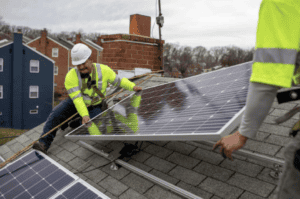The US Department of Commerce has announced anti-dumping duties of up to 271% on solar products imported from Vietnam and other Southeast Asian countries, including Cambodia, Malaysia, and Thailand. This decision aims to address alleged unfair trade practices, as these products are accused of being sold in the US market at prices below production costs, thereby harming the domestic solar industry.
According to the announcement, crystalline silicon photovoltaic (PV) cells exported by several Vietnamese companies will face duties ranging from 53.2% to 56.4%. Other unnamed Vietnamese exporters could face a tariff as high as 271.28%. Similarly, solar products from Cambodia, Malaysia, and Thailand are also subject to significant duties.
This preliminary ruling is part of an ongoing investigation, with the final determination expected in April 2025, followed by a review by the US International Trade Commission (ITC) in June 2025.

Reports from Bloomberg and Vietnamese media on December 2 highlighted the US Department of Commerce’s preliminary findings. The investigation determined that solar panels imported from Cambodia, Malaysia, Thailand, and Vietnam would be subject to tariffs ranging from 21.31% to 271.2%. These measures also apply to some manufacturers owned by or affiliated with Chinese companies, citing evidence of unfair pricing and trade practices.
The ruling, issued by the International Trade Administration (ITA) under the US Department of Commerce on November 29, followed complaints from US domestic producers. They alleged that manufacturers in Southeast Asia were dumping crystalline silicon PV cells—a critical component of solar panels—into the US market at unfairly low prices, negatively impacting domestic manufacturers.
This marks the second major preliminary ruling by the ITA this year. In an earlier decision on October 1, tariffs of up to 292.61% were imposed on PV cells and their components imported from these four Southeast Asian nations. These countries supply a significant share of solar equipment to the US, making the ruling impactful for the domestic market.
Among the companies affected by the new tariffs are Jinko Solar, Trina Solar, and JA Solar, which are owned or closely affiliated with Chinese entities. Following prior US tariffs on Chinese-made solar products, these manufacturers relocated production to Cambodia, Malaysia, Thailand, and Vietnam to circumvent trade restrictions and maintain exports to the US.
The American Alliance for Solar Manufacturing Trade Committee, a coalition of US-based solar manufacturers including First Solar, Hanwha Q Cells USA, and Mission Solar Energy, spearheaded the legal efforts leading to these tariffs. The alliance aims to protect the US solar supply chain from low-price dumping and unfair competition by Southeast Asian and Chinese companies.
Key Details of the November 29 Ruling:
- Cambodia: Solar products imported from Cambodia will be subjected to a 117.1% tariff.
- Malaysia:
- Jinko Solar Technology: 17.8% tariff.
- Other suppliers: Up to 81.2%.
- Hanwha Q Cells Malaysia: 0% tariff, as no dumping activity was identified.
- Vietnam:
- Exporters such as JA Solar Vietnam, Jinko Solar (Vietnam), Boviet Solar Technology, and Trina Solar Energy Development will face tariffs between 53.2% and 56.4%.
- Unspecified Vietnamese crystalline silicon PV cell exporters may face a maximum tariff of 271.28%.
The US Department of Commerce is set to finalize its ruling on these anti-dumping and countervailing duty cases in April 2025. The ITC will then review these findings and issue a final decision in June 2025.
While the current preliminary tariffs may be subject to revision, this decision underscores the US’s intensified efforts to enforce trade rules, particularly in addressing unfair practices in the solar sector. These measures aim to protect domestic solar manufacturing and promote fair competition but could also impose significant economic burdens on importers and associated solar projects.
Data suggests that demand for Vietnamese solar panels in the US has surged. By 2023, nearly one-third of solar panels imported into the US originated from Vietnam. Southeast Asian nations, including Thailand, Malaysia, Cambodia, and Vietnam, collectively accounted for 79.3% of US solar panel imports.
Since President Biden took office, the US has built or expanded 51 solar equipment manufacturing facilities, with plans to increase domestic solar panel production capacity eightfold. However, imports of solar panels, particularly from Southeast Asia, have continued to rise. While the US claims these tariffs are to protect domestic manufacturers, they may also serve to counteract Chinese companies attempting to bypass tariffs by relocating production to Southeast Asia.


